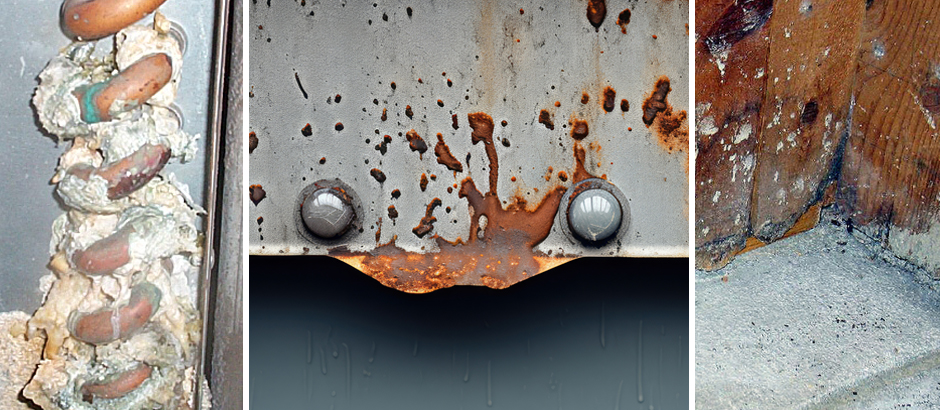
For most of us, condensation is part of daily life, whether it be dew on the grass in the morning, moisture developing on the outside of a beverage can, or water droplets on a mirror in a steamy bathroom. Condensation is the process of a substance (in this case water) changing from gaseous or vapor form to liquid form. It typically occurs when water vapor in warm air comes in contact with a cool surface.
Condensation is a fact of life in HVAC (Heating, Ventilation and Air Conditioning) systems during the cooling process, particularly in higher humidity environments. While condensation alone doesn’t cause problems, the water must be properly managed and removed. If allowed to build up, condensation can cause serious issues and damage. Here are some of the reasons why every HVAC system needs to be designed to deal with condensation:
Mold, mildew and bacteria
When an HVAC system is in cooling mode, moisture in the air condenses into water droplets on the surfaces of cooling coils and other components. If not properly drained or removed, the water can accumulate and create conditions conducive to mold, mildew, and bacterial growth – including in filters and insulation – leading to poor indoor air quality and potential health issues.
Corrosion
Condensation can lead to corrosion of metal components within the HVAC system, including coils, coil casings, air handling unit (AHU) floors and walls, ductwork, and other metallic surfaces. Over time, the presence of moisture can cause corrosion and rust to deteriorate metal components, ultimately compromising their structural integrity.
Other water damage
Depending on the placement of the AHU or cooling coils within a building, there is almost no limit to the amount of damage that can be done when condensation is not managed properly. Water damage can impact everything from carpet, to drywall, to insulation, to wood floors, to computer equipment and other electronics, providing many reasons to make sure condensate is effectively removed from your HVAC system.
Efficiency loss
Excessive condensation can lead to the accumulation of water in ductwork, potentially obstructing airflow and reducing the system’s efficiency. In addition, when coils are covered with condensate due to improper drainage, the system has to work harder to maintain desired temperature levels, leading to increased energy consumption.
Marlo takes condensate management seriously
All Marlo coils and air handling units are designed to properly drain condensate and minimize the possibility of the problems listed above. Because we custom design and build every coil and AHU, we take into consideration each specific application – including the typical humidity levels in the area – and prioritize condensate management.
For extremely humid environments, particularly in hospitals and other applications where HEPA and ULPA filters are used, we also offer our Humidity Control Coils (HCCs). These coils recirculate the warm fluid leaving the coil to, in turn, heat and desaturate the air exiting the coil. They can also be fitted with optional intermediate drain pans to further assist with condensate management.
When it comes to our MarloAIR air handling units, we also design them to eliminate condensation issues. We use integral insulated stainless steel drain pans – which are double pitched – to reduce moisture buildup. In addition, our wall panels are insulated with 2” of foam to provide energy efficiency and to prevent condensation from building up on exterior surfaces. Wall panels are also protected with a polyester coating to resist bacteria and corrosion.
Bottom line, when you choose custom built coils and AHUs from Marlo, our experts are available to discuss the dangers of condensation damage with you, and to develop strategies to combat this problem. Our expertise in condensate management is just one of the reasons why our products last longer than most – and why we can back everything we make with our industry-leading 3-year warranty.
Email Registration
Please complete the form below to sign up for our news alerts and other email communications.
"*" indicates required fields